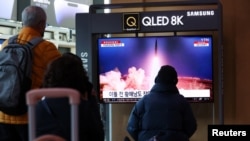North Korea says its Thursday intercontinental ballistic missile launch was a response to ramped up U.S.-South Korea military exercises that began this week.
State media released photos showing North Korean leader Kim Jong Un, alongside his young daughter, observing the launch of what the North said was a Hwasong-17 ICBM.
North Korea conducted the "launching drill" in response to "the large-scale provocative and aggressive war exercises of the United States and the South Korean puppet traitors," according to the official Korean Central News Agency.
"We will make them realize of their own accord that the further their military maneuvers against the DPRK last and expand, the more serious the irretrievable threat to them will be," Kim was quoted as saying, using an abbreviation for North Korea's official name.
The United States and South Korea are in the middle of an 11-day major joint military exercise, which includes the allies' biggest field exercises in five years. The drills have been ramped up over the past year, as North Korea launched a record number of missiles.
At a briefing Thursday, Pentagon spokesperson Brigadier General Patrick Ryder reiterated the U.S. position that the exercises "are defensive in nature and meant to bolster our interoperability and meant to deter potential aggression in the region."
Ryder said North Korea's reaction to the drills is "inappropriate … destabilizing and concerning."
While North Korea insists its latest launch was a response to the drills, in reality it has been firing missiles, including ICBMs, at an intensified level for well over a year.
In 2022, North Korea launched more than 90 missiles, by far the most it has ever fired in a single year. In early November, it launched 23 missiles on a single day.
U.S. and South Korean officials have for months warned that North Korea has completed preparations for another nuclear test, which would be its seventh since 2006.
North Korea has many possible motivations for conducting weapons tests, including developing new capabilities, demonstrating deterrence and signaling resolve to its own people.
Thursday's ICBM launch came just hours ahead of South Korean President Yoon Suk Yeol's summit in Tokyo with Japanese Prime Minister Fumio Kishida.
The highly symbolic Yoon-Kishida meeting was meant to signal a greater willingness by Seoul and Tokyo to look past historical animosities and focus on shared threats, such as North Korea.
North Korea has reacted furiously to increased Japan-South Korea security cooperation, as well as trilateral cooperation with the United States.




